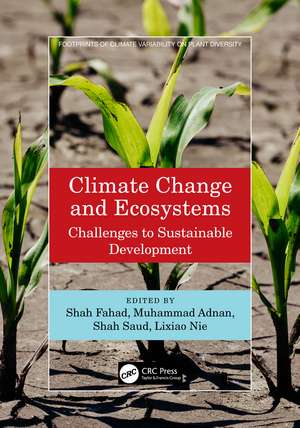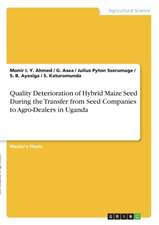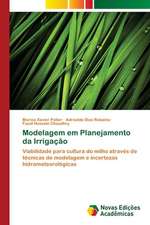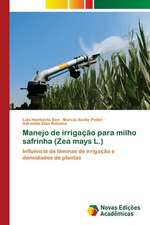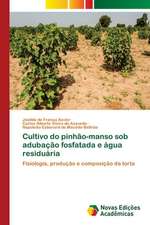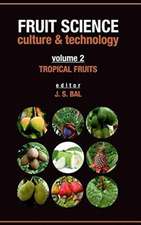Climate Change and Ecosystems: Challenges to Sustainable Development: Footprints of Climate Variability on Plant Diversity
Editat de Shah Fahad, Muhammad Adnan, Shah Saud, Lixiao Nieen Limba Engleză Hardback – 25 iul 2022
Features:
- This book brings together a multidimensional group of international scholars exploring the ethical dimensions of climate change and ecosystem.
- New strategies have been pointed out in this book for better sustainable development.
- This book has been designed to provide a good overview of major challenges facing policymakers, researchers, and ultimately humankind in dealing with climate change.
- This book summarizes the diverse features of vulnerability, adaptation, and amelioration of climate change in respect to plants, crops, soil, and microbes for the sustainability of the agricultural sector, and, ultimately, food security for the future.
- This book provides a state-of-the-art description of the physiological, biochemical, and molecular status of the understanding of abiotic stress in plants.
Preț: 1000.27 lei
Preț vechi: 1219.84 lei
-18% Nou
Puncte Express: 1500
Preț estimativ în valută:
191.43€ • 197.75$ • 159.31£
191.43€ • 197.75$ • 159.31£
Carte tipărită la comandă
Livrare economică 26 martie-09 aprilie
Preluare comenzi: 021 569.72.76
Specificații
ISBN-13: 9781032260686
ISBN-10: 1032260688
Pagini: 278
Ilustrații: 8 Tables, black and white; 20 Line drawings, color; 15 Halftones, color; 35 Illustrations, color
Dimensiuni: 178 x 254 x 20 mm
Greutate: 0.45 kg
Ediția:1
Editura: CRC Press
Colecția CRC Press
Seria Footprints of Climate Variability on Plant Diversity
ISBN-10: 1032260688
Pagini: 278
Ilustrații: 8 Tables, black and white; 20 Line drawings, color; 15 Halftones, color; 35 Illustrations, color
Dimensiuni: 178 x 254 x 20 mm
Greutate: 0.45 kg
Ediția:1
Editura: CRC Press
Colecția CRC Press
Seria Footprints of Climate Variability on Plant Diversity
Public țintă
Postgraduate and ProfessionalCuprins
1. Microbial Flora of Marble Waste Polluted Environment in the Phylogenetic Perspectives. 2. Interaction of Environment and Entomology. 3. Climate Change, Insects and Global Food Production. 4. Extreme High Temperature and Plant Life. 5. Molecular and Physiological Mechanism of Native Plants to Combat Drought Stress Under Changing Climatic Conditions. 6. Climate Change Oriented Elevated Carbon Dioxide: Implications on Plant Physiology and Global Food Security. 7. Effect of Environmental Pollution on Plant Growth. 8. Phyto-Ecological Studies of Genus Phoenix (Linn.), (Dates palms) from Various Zones of Pakistan. 9. Soil Biodiversity in Changing Climate. 10. Biochar Magic Against of Abiotic Stresses. 11. Biomolecular Intervention in Understanding Plant Adaptation to Climate Change. 12. Halophytes Diversity as an Indicator to Saline Environment in Pakistan. 13. Bacterial Contamination in Food Chain; Sources, Impact and Control. 14. Molecular and Ecological Mechanisms of Grasshopper Food Selection and Habitat Adaptation. 15. Climate Change: A Global Perspective. 16. Pollinators Ecology and Management.
Descriere
This book is intended to serve as a stimulating collection that will contribute to debate and reflection on the sustainable future of agriculture and food production in the face of global change.
